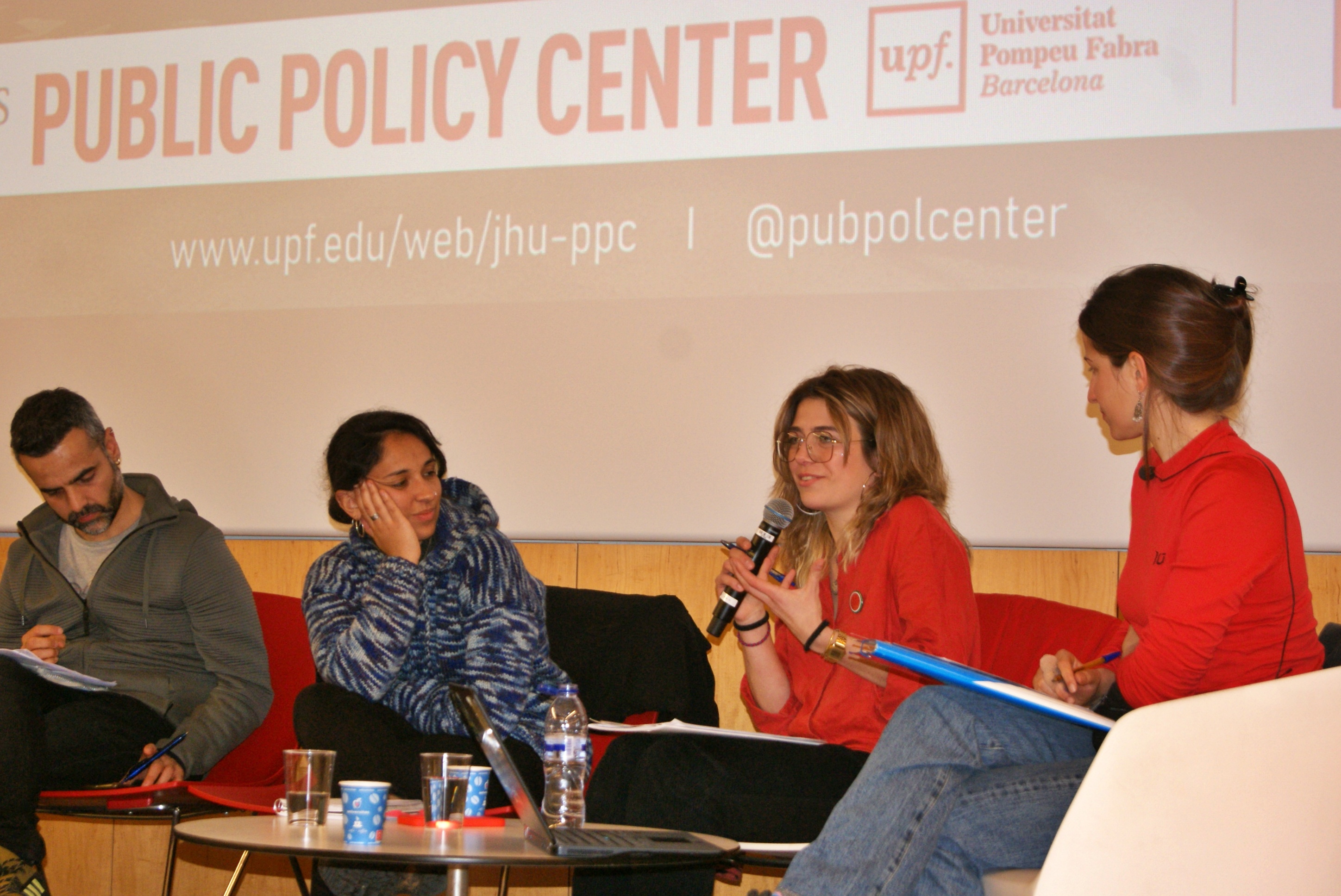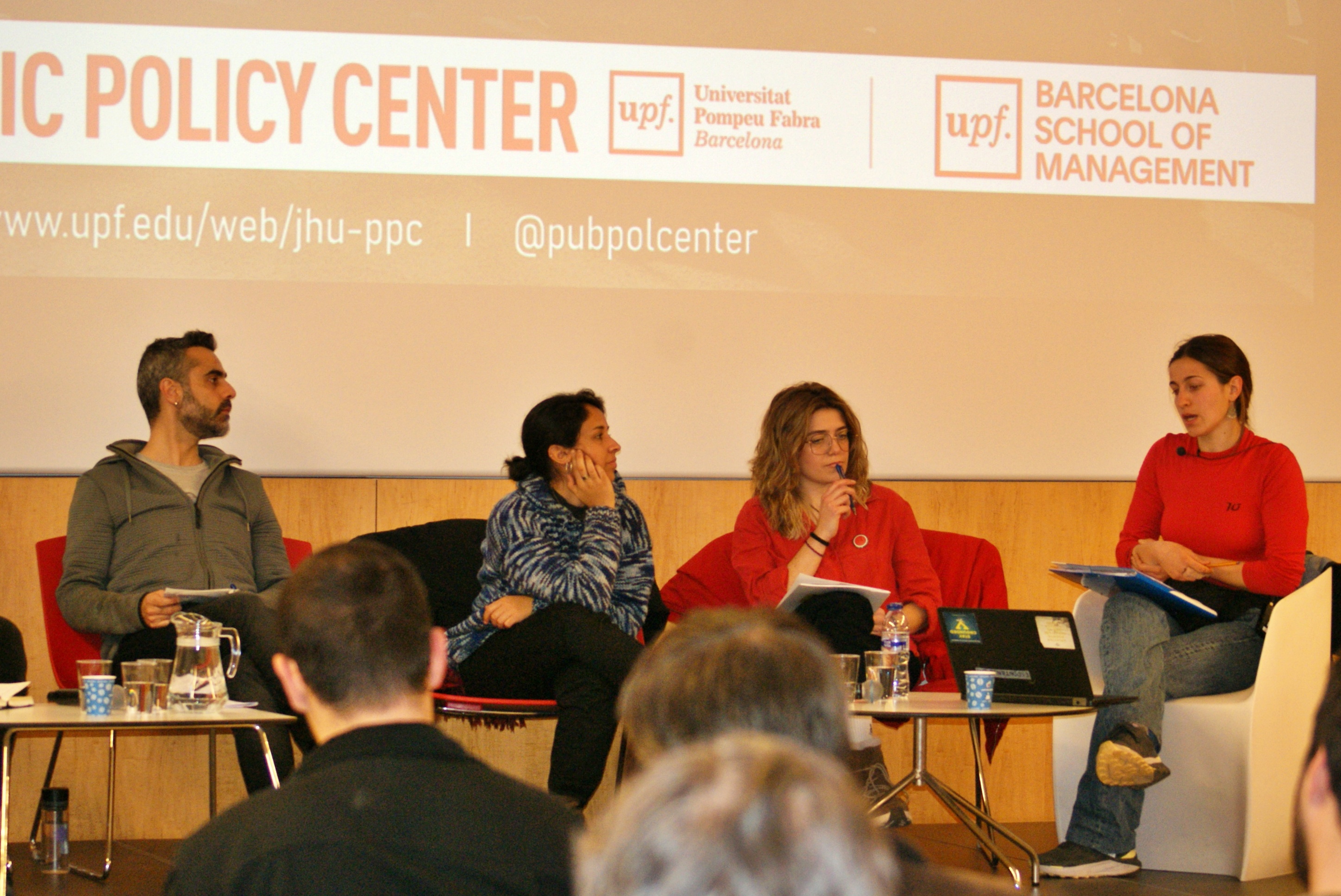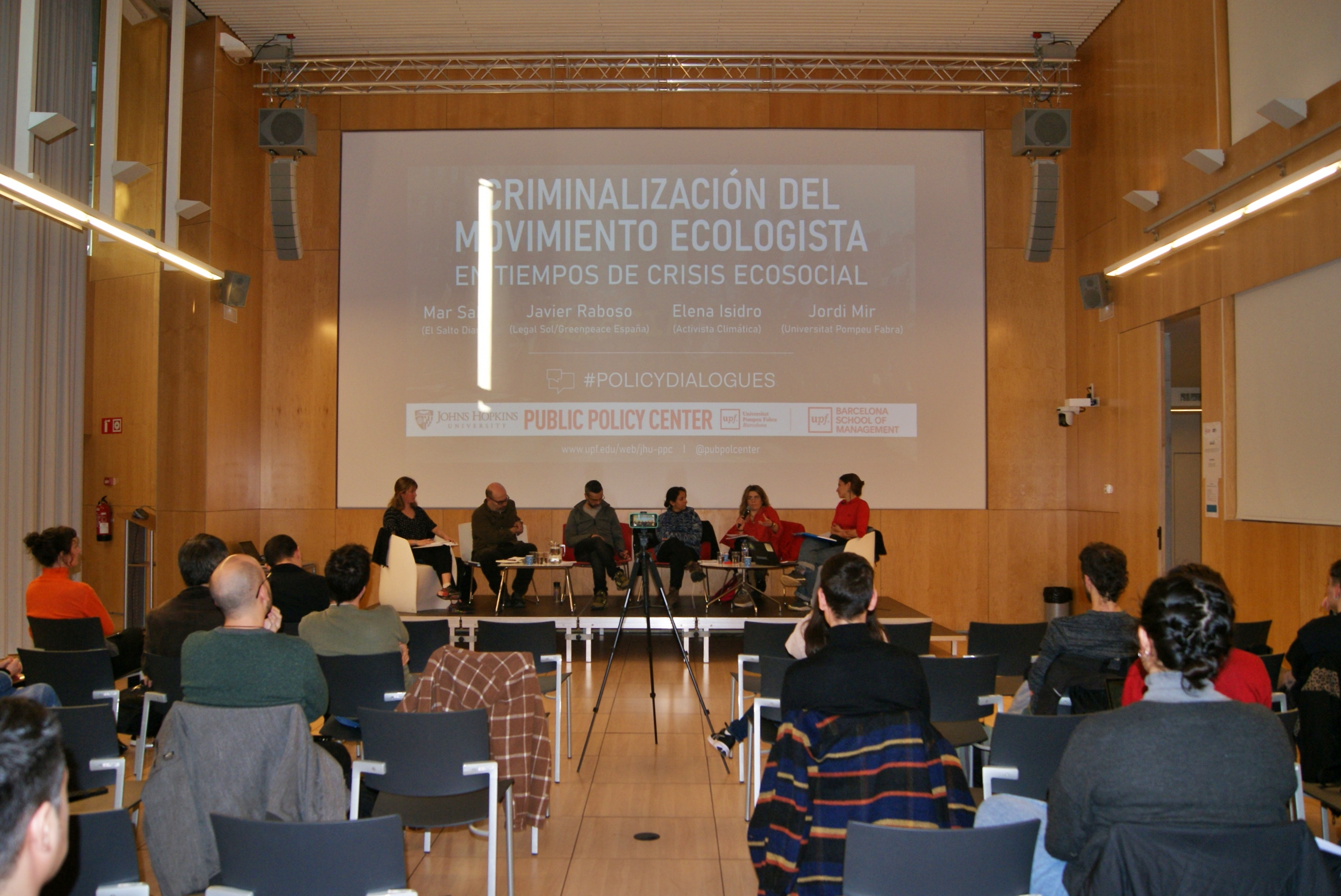“We must continue to be ambitious, take it a step further, and be more united.” Report of the 17th edition of the Policy Dialogues series
“We must continue to be ambitious, take it a step further, and be more united.” Report of the 17th edition of the Policy Dialogues series
In the 17th Policy Dialogues Session, the panel and audience explored the challenges faced by environmental movements amid a rising tide of criminalization. Speakers Mar Sala, Elena Isidro, Javier Raboso and Jordi Mir examined the multifaceted nature of the struggle for environmental justice, exploring topics ranging from the physical and psychological impacts of repression to the significance of solidarity and the use of diverse tactics in confronting repression.

Amid the escalating ecosocial crises that are unravelling across the globe, environmental movements are increasingly vocal about the inadequate political response to these crises. However, activists in Europe face growing repression and criminalization for their actions. Recent months have seen a surge in arrests targeting environmental collectives and journalists across Europe, which are the fruits of a political climate that is increasingly hostile to social movements. For instance, in Spain, the 2022 Annual Report from the Prosecutor's Office even mentioned 'terrorism' in connection with activist groups like Extinction Rebellion and Futuro Vegetal, while in France, the Soulevements de la Terre (Earth Uprisings) movement has faced attempted prohibition. This hostility has been exacerbated in recent years by the rhetoric of the far-right, which has stigmatised environmental activism as 'radical' and 'dangerous'.
These alarming developments underscore the pressing need to address the rise in the criminalization of environmental advocacy and activism in Europe. To this end, the JHU-UPF Public Policy Center held the 17th session of the Policy Dialogues series: "Criminalization of the Environmental Movement in Times of Ecosocial Crisis," aiming to examine the root causes of repression and its implications for society and democracy. The session focused on the case of Spain, due to the speakers’ expertise and experience.
The speakers were Mar Sala, audiovisual journalist and communicator, currently working at El Salto Diario; Javier Raboso, responsible for the Democracy and Peace Culture campaign at Greenpeace Spain and a member of Legal Sol; Elena Isidro Higueras, a climate activist who has collaborated with various collectives such as End Fossil Barcelona and Futuro Vegetal; and Jordi Mir Garcia, Professor at Universitat Pompeu Fabra (UPF) and member of the Center for Studies of Social Movements at UPF. The session was moderated by Laila Vivas and Maria Marcet, two environmental activists who have participated in various social movements in Barcelona. Laila is also a researcher at the Basque Center for Climate Change (BC3), and a visiting researcher at the JHU-UPF Public Policy Center.
Laila Vivas opened the session by highlighting the urgency of discussing the topic in the current ecosocial context, marked by escalating climate change, environmental degradation, and societal inequality. She emphasised the concerning trend of legal persecution and imprisonment of activists, citing recent sentencing demands for those involved in symbolic protests. Vivas pointed out that this crackdown is not limited to Spain but is also occurring in countries like France and Germany. Quoting Yayo Herrero, “a failed society does not know who not to fail”, she underscored the significance of addressing why climate movements are being targeted.
Continuing the session, Maria Marcet took the floor, steering the focus towards an initial assessment of the situation and of the social and personal consequences of repression within environmental collectives, She invited the panellists to share their experiences and provide relevant data on this matter.
Elena Isidro was the first to respond to the question, reflecting on the emergence of new environmental movements such as Extinction Rebellion and Futuro Vegetal. She noted that these movements brought new tactics and discourse, which initially caught the attention of the state and other power structures. However, she said, she has observed a shift in police tactics over time. Initially, their response to direct actions in Barcelona was to ignore them, but as these actions gained more media attention, the approach changed to repression. She highlighted an increase in arrests and harsher treatment, contrasting her experiences in Barcelona with those in Madrid. In Madrid, she faced repeated detentions, spending nights in custody, whereas in Barcelona, activism had not led to detentions until recently. Elena cited a recent incident where fellow activists faced rapid legal action after a direct action, signalling a change in police response.
Mar Sala followed Elena's remarks with a poignant reflection on the broader context of the climate crisis. She highlighted the alarming increase in global temperatures, emphasising that February 2024 had globally been the hottest February on record. Mar underscored the significance of this warming, pointing out that it surpassed the threshold set by the Paris Agreement. Highlighting the importance of peaceful assembly, Mar expressed concern over the growing trend of repression in Spain. Her remarks were informed by her personal experience, where she found herself embroiled in a year-long legal battle after covering a protest in Barcelona as a journalist, underscoring the urgency of protecting democratic rights.
Javier Raboso responded to the question with a thoughtful reflection on the escalating climate crisis and its intersection with democratic freedoms. He noted the rapid acceleration of environmental awareness since 2019 and highlighted the tightening restrictions on democratic space globally, exemplified by the rise of far-right movements. Javier emphasised the compounding challenges faced by activists operating within an increasingly authoritarian framework. He underscored the systemic nature of repression, which is permeating legislative, executive, judicial, and media spheres in Spain and beyond. Drawing parallels with historical struggles for civil liberties, Javier urged solidarity in defending democratic rights against encroaching state power. He concluded by condemning the erosion of democratic norms, exemplified by laws like Spain's "Ley Mordaza," which stifles dissent and perpetuates self-censorship through fear and intimidation.
Following Javier's insightful remarks, Jordi Mir highlighted recent events in Catalonia that underscored the importance of challenging police narratives. Drawing parallels between the repression faced by environmental activists and other social movements, Jordi emphasised that repression targets any group perceived as a threat to established powers, regardless of its size or visibility. He pointed out that while the environmental movement may not yet be as large as other historically-targeted movements, such as the housing rights movement, it still faces significant repression due to its growing legitimacy and the challenge it poses to established norms. Jordi concluded his intervention by stressing the importance of learning from the experiences of other movements and adapting strategies to mitigate the impact of repression on the environmental movement's progress.
Following this round, the debate continued with a question about the effects of the criminalization on these movements. In response, Mar Sala summarised the general sentiment of the speakers by highlighting how repression directly impacts individuals and collectives, diverting their focus, energy and resources from working towards the movement’s aims to managing repression (i.e. paying fines and fighting court cases). Additionally, she pointed out the insidious impact of police infiltration, which undermines internal trust within movements and destabilises their structures.
Responding to a question on what can be done to address the criminalization of the environmental movement, Javier Raboso provided insightful information. He emphasised the importance of recognizing the physical and psychosocial impacts of repression, citing a recent report from Novact and Irídia on the physical consequences of riot control materials, which identified approximately 40 activist victims of kinetic projectiles, including rubber bullets. He noted that the impacts of this violence extend beyond the physical realm, causing psychological distress and social isolation among activists. Javier underscored the necessity of denouncing such repression through explicit campaigns and using creative methods, such as humour, to raise awareness. He also advocated solidarity and mutual support within the movement. Furthermore, he stressed the importance of legal recourse and political advocacy to challenge repressive laws like the “Ley Mordaza” and to hold police accountable for instances of abuse. In essence, his remarks highlighted a multifaceted approach encompassing reporting, solidarity, legal action, political engagement, and awareness-raising as essential strategies in combating the criminalization of environmental activism.
In closing, Elena Isidro, as an environmental activist who has put her body on the line numerous times to protest against climate change, emphasised the importance of ambition, despite that fact that she is currently facing an investigation that has led her to step back from activism: "We need to diversify tactics and maintain our ambition. We must continue to be ambitious, take it a step further, and be more united. Ambition helps us bring more people together."
The session concluded with a round of Q&As, in which the participants posed questions about the future of social movements, especially environmental movements, and ways to confront this repression.


